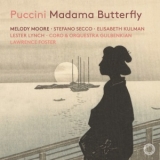Es ist vor allem Lawrence Foster, der diese Butterfly-Aufnahme prägt. Er dirigiert eine im Grunde sehr moderne, etwas scharf-trockene Version der Oper. Farben, Kontraste, Spannung, musikalischer Fluss, alles ist in einer sehr sachlichen Interpretation auf Fakten ausgerichtet, nicht auf lyrische Sinnlichkeit und Wärme.
Melody Moore ist stimmlich gut, aber darstellerisch weit entfernt von jener Mischung aus Unschuld und sinnlicher Leidenschaft, von der Puccini geträumt haben muss. Sie kann die Gefühle der Butterfly nicht wirklich wiedergeben, vor allem gelingt es ihr nicht, die Entwicklung der Figur zwischen dem ersten und dem letzten Satz glaubhaft darzustellen. Außerdem trifft auf sie das ewige Problem von Cio-Cio Sans Jugend zu. Sie ist im ersten Akt fünfzehn und ihm zweiten achtzehn, aber durch die Qualen der Liebe sehr viel reifer. Dennoch kennzeichnet eine gewisse Naivität ihr ganzes Verhalten. Und das kann die Moore nicht wirklich herüberhingen. Im ersten Akt wirkt die Stimme deutlich zu alt, während das im zweiten weniger Probleme bereitet. Sie hat ganz gewiss wunderbare Momente, aber sie erreicht nie die Mädchenhaftigkeit Mirella Frenis oder die immer wieder unglaubliche zwingende Charakterisierungskraft der Callas. Man darf auch nicht zu sehr an Ermonela Jaho in dieser Rolle denken (um nur eine heutige Sängerin zu erwähnen), um von Moore nicht total enttäuscht zu sein.
Stefano Secco hat als Pinkerton zwar eine beeindruckend starke und höhensichere Stimme, aber sie ist scharf und nicht geschmeidig. Er hat nicht den stimmlichen Glanz der großen Tenöre, es fehlt ihm der lyrische Schmelz in Verbindung mit metallischen Glanz, es fehlt ihm die Kraft des schönen Legato. Sein Pinkerton wirkt kühl und glatt, kommt ohne wirkliche Leidenschaft aus.
Elisabeth Kulman ist eine gute, einfühlsam singende Suzuki. Lester Lynch singt einen bestenfalls korrekten Sharpless, bleibt gestalterisch wie auch stimmlich hinter den großen Interpreten der Rolle zurück.
Fazit: Die Neuproduktion kann es mit den Spitzeneinspielungen im Katalog nicht aufnehmen: Karajan (2x), Leinsdorf und Sinopoli bleiben nach wie vor erste Wahl.
It is Lawrence Foster, above all, who shapes this Butterfly recording. He conducts a basically very modern, somewhat sharp-dry version of the opera. Colors, contrasts, tension, musical flow, everything is focused on a very matter-of-fact interpretation, not on lyrical sensuality and warmth.
Melody Moore is vocally good, but her characterization of the role is far from that blend of innocence and sensual passion that Puccini must have dreamed of. She can’t really convey Butterfly’s emotions, and in particular she fails to believably portray the character’s development between the first and last movements. Moreover, the eternal problem of Cio-Cio San’s youth applies to her. She is fifteen in the first act and eighteen in the second, but much more mature due to the agonies of love. Still, a certain naiveté characterizes all her behavior. And Moore can’t really bring that across. In the first act, the voice seems clearly too old, while in the second it is less of a problem. She certainly has wonderful moments, but she never achieves the girlishness of Mirella Freni or the always incredible compelling power of characterization of Maria Callas. Nor should one think of Ermonela Jaho in this role (just to mention one present-day singer) to prevent total disappointment in Moore’s performance.
Stefano Secco, as Pinkerton, has an impressively strong and high-pitched voice, but it is sharp and not supple. He lacks the vocal brilliance of the great tenors, he lacks the lyrical melt combined with metallic brilliance, he lacks the power of beautiful legato. His Pinkerton comes across as cool and smooth, lacking any real passion.
Elisabeth Kulman is a good, sensitive singing Suzuki. Lester Lynch sings a Sharpless that is correct at best, falling short of the great interpreters of the role both in design and vocally.
Conclusion: the new production cannot compete with the top recordings in the catalog: Karajan (2x), Leinsdorf and Sinopoli remain first choice.
























